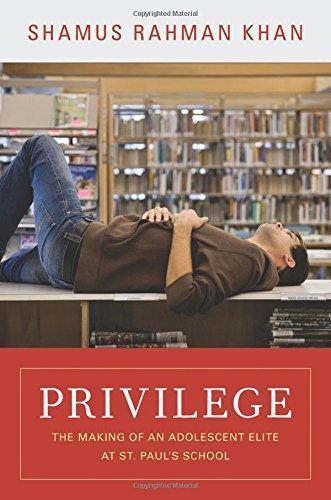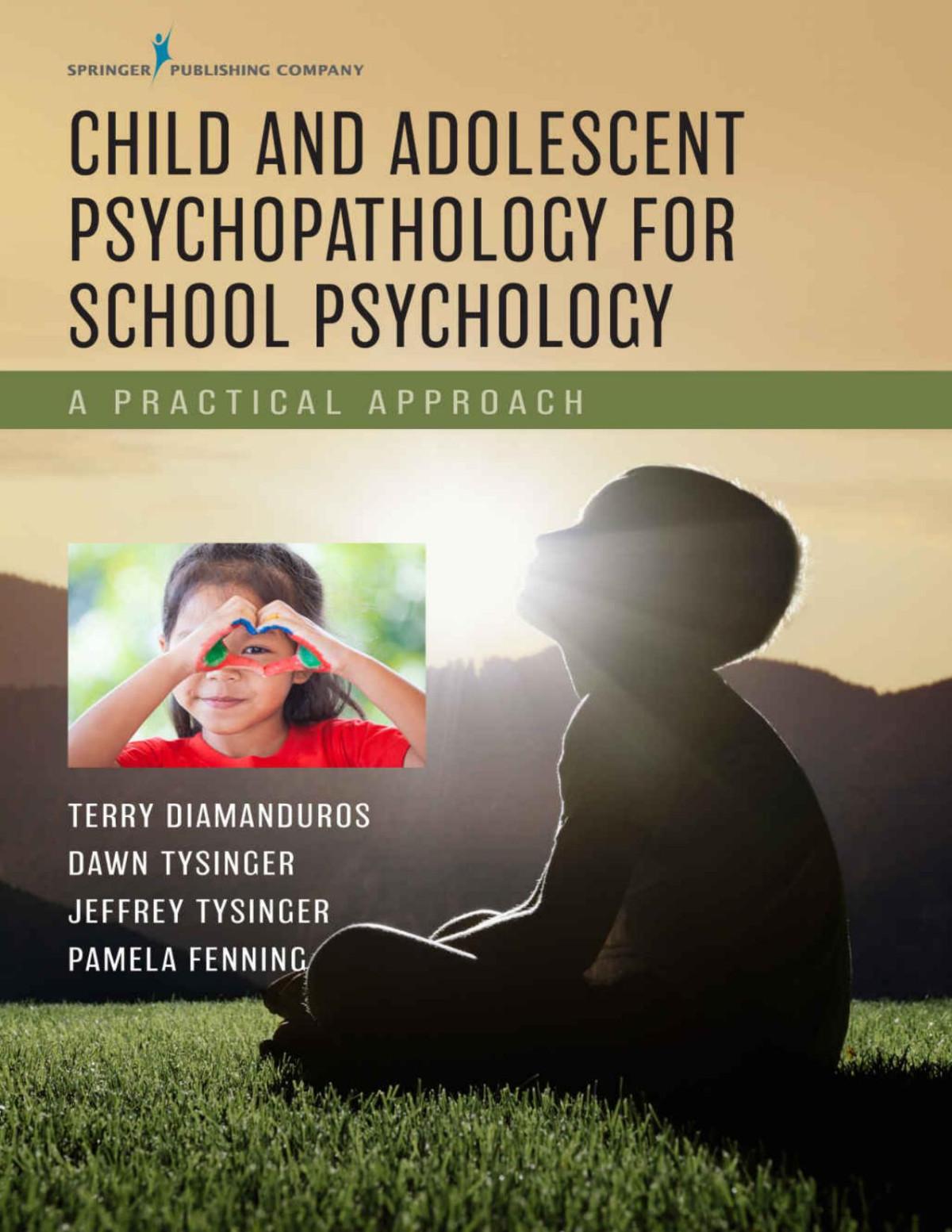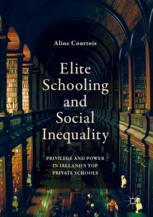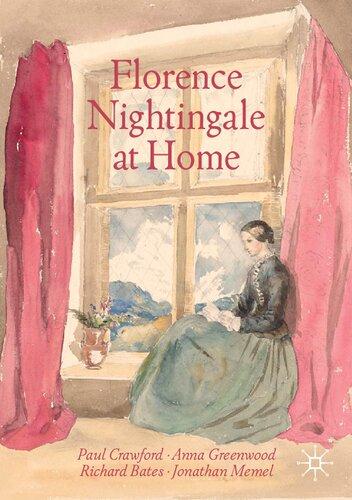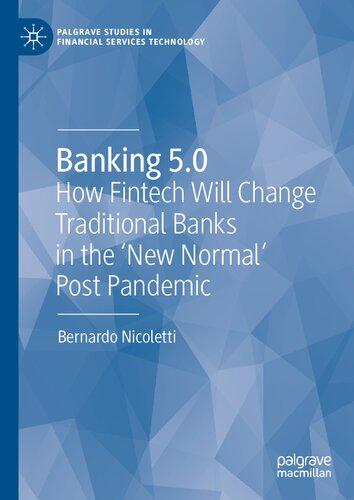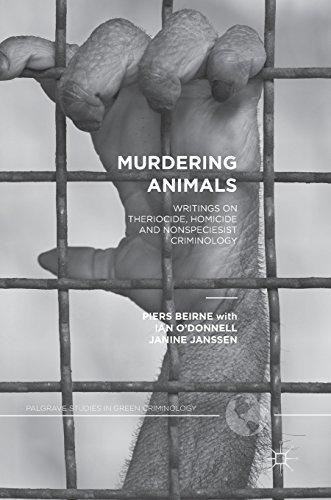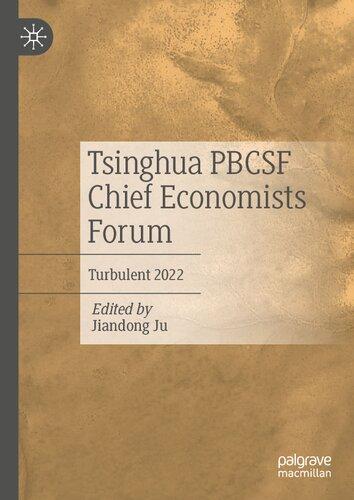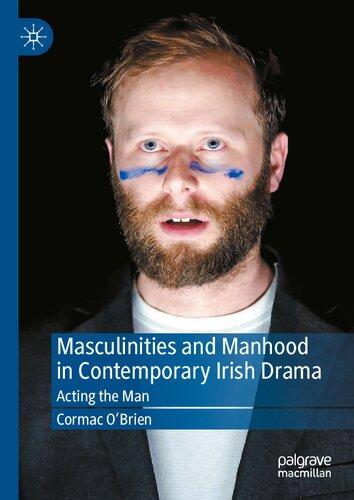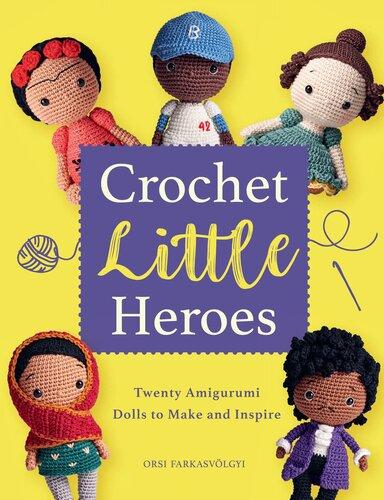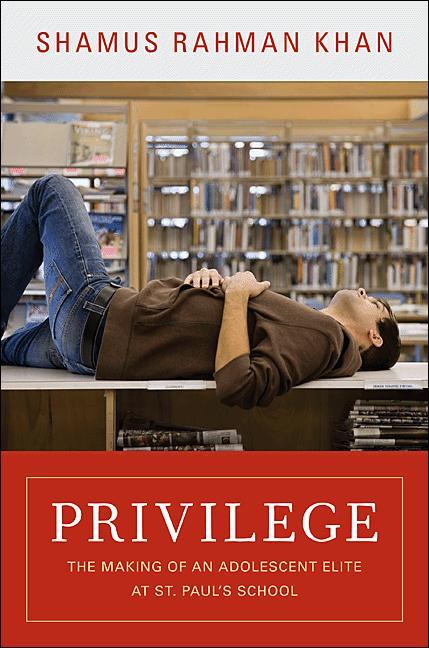Privilege:TheMakingofanAdolescentEliteat St.Paul’sSchool(The
https://ebookmass.com/product/privilege-the-making-of-anadolescent-elite-at-st-pauls-school-the/
Instant digital products (PDF, ePub, MOBI) ready for you
Download now and discover formats that fit your needs...
Child and Adolescent Psychopathology for School Psychology 1st Edition Terry Diamanduros
https://ebookmass.com/product/child-and-adolescent-psychopathologyfor-school-psychology-1st-edition-terry-diamanduros/
ebookmass.com
Elite Schooling and Social Inequality: Privilege and Power in Ireland's Top Private Schools 1st Edition Aline Courtois (Auth.)
https://ebookmass.com/product/elite-schooling-and-social-inequalityprivilege-and-power-in-irelands-top-private-schools-1st-edition-alinecourtois-auth/
ebookmass.com
Florence Nightingale at Home Paul Crawford
https://ebookmass.com/product/florence-nightingale-at-home-paulcrawford/ ebookmass.com
Banking 5.0: How Fintech Will Change Traditional Banks in the 'New Normal' Post Pandemic Bernardo Nicoletti
https://ebookmass.com/product/banking-5-0-how-fintech-will-changetraditional-banks-in-the-new-normal-post-pandemic-bernardo-nicoletti/ ebookmass.com
Noble Hearts Box Set: Books One - Three Anna St. Claire
https://ebookmass.com/product/noble-hearts-box-set-books-one-threeanna-st-claire/
ebookmass.com
Dark Fae Princess: A Whychoose Fantasy Romance Newton
https://ebookmass.com/product/dark-fae-princess-a-whychoose-fantasyromance-newton/
ebookmass.com
Murdering Animals: Writings on Theriocide, Homicide and Nonspeciesist Criminology 1st ed. 2018 Edition Piers
Beirne
https://ebookmass.com/product/murdering-animals-writings-ontheriocide-homicide-and-nonspeciesist-criminology-1st-ed-2018-editionpiers-beirne/ ebookmass.com
Tsinghua PBCSF Chief Economists Forum: Turbulent 2022 Jiandong Ju
https://ebookmass.com/product/tsinghua-pbcsf-chief-economists-forumturbulent-2022-jiandong-ju/
ebookmass.com
Masculinities and Manhood in Contemporary Irish Drama: Acting the Man Cormac O'Brien
https://ebookmass.com/product/masculinities-and-manhood-incontemporary-irish-drama-acting-the-man-cormac-obrien/
ebookmass.com
https://ebookmass.com/product/crochet-little-heroes-20-amigurumidolls-to-make-and-inspire-orsi-farkasvolgyi/
ebookmass.com
Introduction: Democratic Inequality
The direction in which education starts a man will determine his future in life.
My story is part of the larger American story.
I am surrounded by black and Latino boys. As I looked around the common room of my new dorm this was all I could think about. It was September 1993, and I was a rather young fourteen-year-old leaving home for the first time. My parents, who had helped me unpack my room and were about to say good-bye, noticed as well. We didn’t say anything to one another. But the surprise on their faces was mirrored on my own. This was not what I expected, enrolling at a place like St. Paul’s School. I thought I would be unlike everyone else. I thought my name and just-darker-than-olive skin would make me the most extreme outlier among the students. But though my parents grew up in small rural villages in Pakistan and Ireland and my father was not white, they had become wealthy. My father was a successful surgeon; my mother was a nurse. I had been at private school since seventh grade, and being partly from the Indian subcontinent hardly afforded one oppressed minority status. For the other boys around me, those from poor neighborhoods in America’s urban centers, St. Paul’s was a much more jarring experience. I quickly realized that St. Paul’s was far from racially diverse. That sea of dark skin only existed because we all lived in the same place: the minority student dorm. There was one for girls and one for boys. The other eighteen houses on campus were overwhelmingly filled with those whom you would expect to be at a school that educates families like the Rockefellers and Vanderbilts. This sequestering was not an intentionally racist practice
Plato
Barack Obama
of the school. In fact the school was very self-conscious about it and a few years prior tried to distribute students of color across all houses on campus. But the non-white students complained. Though their neighborhoods of Harlem and the Upper East Side might border each other, a fairly large chasm separated the non-elite and elite students. They had difficulty living with one another. Within a year the minority student dorm returned. Non-white students were sequestered in their own space, just like most of them were in their ethnic neighborhoods back home.
I grew up in a variety of neighborhoods, but like most Americans, none of them was particularly diverse.1 My parents’ lives had not been much different until they met one another. In no small part this was because they grew up in rural towns in poor nations. My father’s village consisted of subsistence farmers; things like electricity and plumbing arrived during my own childhood visits. My mother grew up on a small farm on the weatherbeaten west coast of Ireland. At the time she was born, her family pumped their own water, had no electricity, and cooked on an open hearth. Modern comforts arrived during her childhood.
My parents’ story is a familiar one. Their ambitions drove them to the promise of America. Early in life I lived in New York’s rural Allegany County. But seeking to make the most of American opportunities, my parents moved to the suburbs of Boston where the schools were better and the chances for me and my brother were greater. There was more to this move than just new schools. The Pontiac that was standard in the driveways of rural America was replaced by a European luxury car. The trips to visit family in Ireland and Pakistan were augmented by tours of Europe, South America, and Asia. My parents did what many immigrants do: they played cultural catch-up. I spent my Saturdays attending the New England Conservatory of Music. Public school education was abandoned for private academies. There was no more time for my religious education. We became cosmopolitan.
For all these changes, my father never lost some of the cultural marks of a rural Pakistani villager, and many in Boston did not let him forget his roots. He was happiest working with his hands, whether doing surgery or toiling in the earth. As he spent his free time sculpting the garden of our home into a place that would soon be put on garden tours, he was mistaken for a hired hand by visitors. During a visit to our home, one of my father’s colleagues exclaimed, “Where are your books!?” Never in
my life have I seen my father read a novel; his favorite music is still from the Indian movies of his childhood or the songs that greeted him when he arrived in Detroit in the early 1970s. He would not know Bach from Schoenberg. My father’s reply to this cultural scolding by a New England blue blood was prescient: “Someday, my kids can have all the books they want.” My parents were justifiably proud of what they had achieved, and the cultural tastes they would never develop they would instill in their children. We ate at fine restaurants. At one of these restaurants I saw my father, raised a Muslim, take his first sip of wine. The snobbery that always stung me—waiters handing me or my brother a wine list instead of my parents, who were clearly paying for the meal—seemed not to bother them. Compared to their achievements, these slights were trivial.
Attending an elite high school was the ultimate mark of success in our bourgeois suburban world, and I was determined to do so. My parents were not enthusiastic about my leaving home, but they knew the advantages of boarding school. Perhaps thinking of their own lives, they respected my desire to head out on my own. St. Paul’s was on my tour of New England boarding schools. I didn’t know anything about the place, but during my visit I was seduced. The school is a truly stunning physical place—one of the most beautiful campuses in the world. Luckily, I was accepted.
I was unprepared for my new life. The shock of moving from poor rural New York to rich suburban Boston was repeated during my first days at St. Paul’s. This school had long been home to the social elite of the nation. Here were members of a national upper class that went well beyond the professional circles of my suburban home. Children with multiple homes who chartered planes for weekend international trips, came from family dynasties, and inherited unimaginable advantages met me on the school’s brick paths. My parents’ newfound wealth was miniscule compared to many at the school. And in my first days, all the European tours, violin lessons, and private schooling could not buy me a place among many of my classmates. I was not comfortable around this new group of people. I instead found a home by recessing into my dorm, away from the entitlements of most of my classmates.
For my entire time at St. Paul’s I lived in the same minority student dorm. But as I became more at ease at the school, as I began to understand the place and my classmates, I also began to find ways to fit in. Upon graduating I was elected by my classmates to represent them on the
board of managers of the alumni. While this respect of my peers made me proud, I was not sad to be moving on. I had purposefully not applied to the Ivy League schools that my classmates would be attending. St. Paul’s was a world I had learned to fit into but one that I was not particularly happy in.
The source of my discontent was my increasing awareness of inequality. I kept returning to my first days: both my surprise at my minority student dorm and my discomfort among my elite classmates. The experience remained an aggravating curiosity. Why was elite schooling like a birthright for some Americans and a herculean achievement for others? Why did students from certain backgrounds seem to have such an easy time feeling comfortable and doing well at the school while others seemed to relentlessly struggle? And, most important, while students were repeatedly told that we were among the best of the best,2 why was it that so many of the best came from among the rich? These were all questions about inequality, and they drove me away from the world of St. Paul’s. But learning more about inequality also brought me back.
Democratic Inequality, Elite Education, and the Rise of the Meritocracy
No society will ever be equal. Questions about inequality are not “Is there inequality?” but instead “How much inequality is there, and what is its character?” Inequality is more tolerable if its character is perceived as “fair.” Systematic, durable inequalities3—those where advantages and disadvantages are transferred from generation to generation—are largely unacceptable to our contemporary sensibility. We are unhappy if our poor always remain poor or our rich seem to have a stranglehold on wealth. We are similarly uncomfortable with the notion that ascribed characteristics like race help determine our life chances. Levels of inequality are slightly more contentious. Some of us do not mind large gaps between rich and poor if the poor receive a livable income and the rich are given the capacity to innovate to create more wealth. Others feel that larger and larger gaps generate social problems. The evidence seems to show that inequality is bad for societies.4 Following these data, I am among those who believe that too much inequality is both immoral and inefficient.
One of the curiosities in recent years is how our social institutions have opened to those they previously excluded, yet at the same time inequality has increased. We live in a world of democratic inequality, by which I mean that our nation embraces the democratic principle of openness and access, yet as that embrace has increased so too have our levels of inequality. We often think of openness and equality as going hand in hand. And yet if we look at our experiences over the last fifty years we can see that that is simply not the case. This is most notable in elite colleges, where student bodies are increasingly racially diverse but simultaneously richer.
In 1951 blacks made up approximately 0.8 percent of the students at elite colleges.5 Today blacks make up about 8 percent of Ivy League students; the Columbia class of 2014 is 13 percent black—representative of the black population in our nation as a whole. A similar change could be shown for other races, and women today are outperforming men, creating a gender gap in college attendance in favor of women.6 Without question our elite educational institutions have become far more open racially and to women. This is a tremendous transformation, nothing short of a revolution. And it has happened not only in our schools but also in our political and economic life.
Yet at the same time the overall level of inequality has increased dramatically. When we think of inequality we often think of poverty. And when social scientists study inequality they tend to focus on the conditions of disadvantage. There are good reasons for this—understanding the lives of the poor should help us alleviate some of the difficulties of poverty. But if we want to understand the recent increases in American inequality we must know more about the wealthy, as well as the institutions that are important for their production and maintenance. This becomes clear if we look at what has happened to the incomes of American households over the last forty years. From 1967 to 2008 average American households saw their earnings increase about 25 percent. This is respectable but hardly laudatory. But as we move up the income ladder, we see something quite dramatic. The incomes of the richest 5 percent of households increased 68 percent. And the higher we go, the greater the increase in income. The top 1 percent of American households saw their incomes increase by 323 percent, and the richest 0.1 percent of Americans received a staggering 492 percent increase in earnings.7 Why has inequality increased over the past forty years? Mostly because of the exploding incomes of the rich.
These dual tranformations of increasing openness and inequality run against many of our intuitions about how social processes work. How is it that some of our most elite and august institutions—those that are central pathways to reaching the highest levels of economic success—have transformed into being more open to those they previously excluded, yet the overall levels of inequality in our nation have increased so dramatically? How is it that our democratic ideal of greater openness has transferred into a much better life for the privileged few but stagnation for most of our nation?
Part of the explanation emerges once we look at class. The “openness” I have highlighted is racial. But if we add class to the mix, we see something quite different. While elite private colleges send out press release after press release proclaiming how they are helping make college affordable to the average American, the reality of college is that it is a place dominated by the rich. As my colleague Andrew Delbanco has noted,
Ninety percent of Harvard students come from families earning more than the median national income of $55,000, and Harvard’s dean of admissions . . . defined “middle-income” Harvard families as those earning between $110,000 and $200,000. . . . Today’s students are richer on average than their predecessors. Between the mid1970s and mid-1990s, in a sample of eleven prestigious colleges, the percentage of students from families in the bottom quartile of national family income remained roughly steady—around 10 percent. During the same period the percentage of students from the top quartile rose sharply, from a little more than one third to fully half. . . . And if the sample is broadened to include the top 150 colleges, the percentage of students from the bottom quartile drops to 3 percent.8
Harvard’s “middle income” is the richest 5 percent of our nation.9 This alone should tell us a lot about our elite educational institutions. While they look more open to us, this is in no small part because to us openness means diversity, and diversity means race. But class matters. Though poor students experience a host of disadvantages—from lowerquality schools to difficult access to out-of-school enrichment programs to the absence of support when they struggle—colleges are largely blind
to such struggles, treating poorer students as if they were the same as rich ones. This is in stark contrast to students who are legacies (whose past family members attended the college), athletes, or members of a minority group. Though students from these three groups are provided special consideration by colleges, increasing their chances of admission, poorer students are afforded no such luxury.10 They may claim otherwise, but colleges are truly “need blind” in the worst possible way. They are ambivalent to the disadvantages of poverty. The result is a clear class bias in college enrollments. College professors, looking at our classrooms, know this sad truth quite well. Put simply, lots of rich kids go to college. Few poor ones do.11
As I discuss inequality I keep returning to education, and elite education in particular. This is no accident. One of the best predictors of your earnings is your level of education; attending an elite educational institution increases your wages even further.12 Schooling matters for wealth. If the competitive nature of the college application process is any indicator, it’s clear that most Americans know this story quite well. Given that increases in inequality over the past fifty years are in no small part explained by the expansion of wealth, and elite schooling is central to becoming an elite, we need to know more about how elite schools are training those who are driving inequality.
Before casting elite schools as the villains of our story, we must pause. For all my criticism of elite schools as bastions of wealth, we must remember that these are not simply nefarious places, committed to producing the rich. And as far back as 1940, James Bryant Conant, the president of Harvard University, declared it our national duty “to afford all an unfettered start and a fair chance in the race of life.” Conant imagined creating a Jeffersonian ideal of a “natural aristocracy” where the elite would be selected on the basis of talent. At his core Conant was a Tocquevillian, hoping to strike a blow at the heart of the undeserving elite and replace it with what he imagined made America great: equality of conditions.13 Over the past sixty years elite schools have made attempts to shift away from being bastions of entitled rich boys toward being places for the talented members of all of society. Many accepted black students long before they were compelled to do so by the pressures of the civil rights movement. They similarly transformed into places that do not just “allow” women; they created the conditions in which they could thrive. These schools’ religious foundations
led them to imagine that they were not simply places for the education of the advantaged but places that lead to the betterment of society.
In no small part this leading has meant attempts to create a meritocracy of talent. Things like the SAT—a test seeking to evaluate the “natural aptitude” of students and move away from favoring their wealth and lineage— emerged out of the ideal.14 The test was imagined and instituted by Henry Chauncey, a descendant of Puritan ministers who arrived in this country in the 1630s. His family were firmly part of the American WASP establishment; they were among the very first students at the Groton School, one of the nation’s premier boarding schools, and Chauncey himself was a graduate of and later a dean at Harvard. Through the SAT Chauncey sought to level the playing field and in the process transform elite schools and thereby the elite. The paradox of open inequality shows how this project has been both a tremendous success and a tremendous failure. Who is at elite schools seems to have shifted. But the elite seem to have a firmer and firmer hold on our nation’s wealth and power.
One reason is that there is nothing innate about “merit.” Though we tend to think of merit as those qualities that are abstract and ahistorical, in fact what counts as meritorious is highly contextual. Many scholars have pointed to the ways in which our definitions of merit change over time, depending on cultural and institutional contexts.15 The term “meritocracy” was coined by Michael Young. In the 1940s Young had been asked by England’s Labour Party to help institute and evaluate a new educational system meant to allow all young Britons the opportunity acquire the best education, should they be able. Young soon became cynical of the kind of technocratic approach to human character that such an education seemed to promote. Struggling to think of a word to describe this new system, he played off “aristocracy” and “democracy.” Rather than “rule by the best” (aristos) or “rule by the people” (demos), this system would establish “rule by the cleverest people.”16 Though we often think of the word as something admirable, Young invented it to damn what he saw as the cold scientization of ability and the bureaucratization of talent.
At its core, “meritocracy” is a form of social engineering, aimed at identifying the talents of members of society so that individuals can be selected for appropriate opportunities. In the case of the SAT this means evaluating particular mathematics, reading, writing, and vocabulary skills and using them as indicators of academic ability.17 This move toward meritocracy has
sought to decollectivize formerly valued attributes and instead individualize new ones that are “innate.” Rather than accept students because they manifest a character that revealed good heritage, this new system would look beyond the trappings of society and reward people’s inherent individual talents. When meritocracy began to make its way into college admissions, then dean of Harvard admissions, Wilbur Bender, worried, “Are there any good ways of identifying and measuring goodness, humanity, character, warmth, enthusiasm, responsibility, vitality, creativity, independence, heterosexuality, etc., etc., or should we care about these anyhow?”18
As Jerome Karabel has shown, many of these traits were used as proxies for elite status.19 Bender, the child of Mennonite parents from Goshen, Indiana, was no elite WASP. But he expressed concerns that echoed throughout the world of elite education in the 1950s and 1960s: what might happen to the elements of character that so marked the old American elite? Would the rise of the meritocracy mean the death of the old elite?
With “merit” we seem to have stripped individuals of the old baggage of social ties and status and replaced it with personal attributes—hard work, discipline, native intelligence, and other forms of human capital that can be evaluated separate from the conditions of social life. And the impact of the adoption of this approach has led to rather contradictory outcomes. It has undercut nepotism. It has been used to promote the opening of schools to talented members of society who previously were excluded. But it has also been used to question policies like affirmative action that take into account factors other than performance on select technocratic instruments. It has been used to justify the increased wages of the already wealthy (as their skills are so valuable and irreplaceable). And most important for me, it has obscured how outcomes are not simply a product of individual traits. As I shall argue, this meritocracy of hard work and achievement has naturalized socially constituted distinctions, making differences in outcomes appear a product of who people are rather than a product of the conditions of their making. It is through looking at the rise of the meritocracy that we can better understand the new elite and thereby some of the workings of our contemporary inequality.
In exploring St. Paul’s I will show how the school produces “meritorious” traits of students. We will see how these attributes are developed within elite settings that few have access to. What seems natural is made, but access to that making is strictly limited. Returning to my first days at
XXXVI
IN the meantime Mr. James Dodson had hurriedly left the precincts of the court. He had made his way headlong to the refreshment buffet of the Brontë Hotel.
“Chrissie,” said the eminent philosopher, “I want something that in the quickest possible time will make me blind to the world. And as soon as I am blind to the world I want you to put me in a cab and send me home.”
“What’s up, Jimmy?” said the lady at the buffet, betraying a lively curiosity. “It isn’t love, because I know by experience that you are not built in that way.”
“A lot you know about it,” said the philosopher hoarsely. “You think because you have thrown me over twice and I have not said a word about it, I haven’t got any feelings at all. You are wrong, Chrissie. If you touch me in the right spot I have to squeal just like anybody else. I want to knock my head against that beer-engine until I can’t feel anything more. And why do you think I want to do that?”
“Ask me another, James Dodson,” said the siren. “But for whatever reason you want to do it, I know very well it is not love.”
“Well, if it is not love,” said Mr. Dodson, “I don’t know what the name is for it. Here is a chap I have known seven years, who was nothing to me at first, who was not the kind of chap a fellow like me would take up with, who has been found guilty of doing things—not one thing mind you, but two—and although he has been found guilty, I say and he owns up himself and he has just been put away for six months’ hard labour—the whole business makes me feel —makes me feel, Chrissie, as though I want to commit a murder.”
“Whatever you do, Jimmy,” said the siren, who was genuinely alarmed, “you must keep off brandy. You are absolutely off the
square. I can’t make out what is the matter with you; I should have said you would have been the last chap in the world to let go like this.”
“So should I, old girl,” said Mr. Dodson. “I don’t recognize J. D. in this affair at all. The fact is, J. D. never has recognized himself in his dealings with that poor lunatic. But there has come to be something about that chap that is more to me than my own flesh and blood. If it isn’t love I don’t know what it is; yet why it should be love I don’t know. As you know, old girl, I don’t believe much in religion as a general thing, but it has seemed to me lately that that chap was just a saint in disguise. And now they have taken him from me—put him away in gaol—to hard labour—and he deserves it too—and—and, old girl, it has kind of knocked the bottom out of my little world altogether—and—and I feel that I shall never be able to believe in anything again.”
“Steady, old boy,” said Chrissie with an ample yet robust sympathy. “I don’t like to see you let go.”
“I don’t like it either,” said the philosopher whitely. “But I feel just now that I must either let out a little or go mad. One thing is dead sure; I mustn’t go back to the office at present. If I do I am certain to murder Octavius.”
“Jimmy,” said Chrissie, with matronly reserve from behind the buffet, “if you like to bring that ring back again to-morrow I’ll wear it.”
“You give me something that will put me to sleep,” said the philosopher hoarsely and with wild eyes. “Anything—I don’t care what—as long as it does it soon.”

